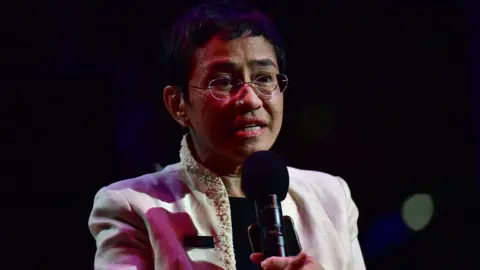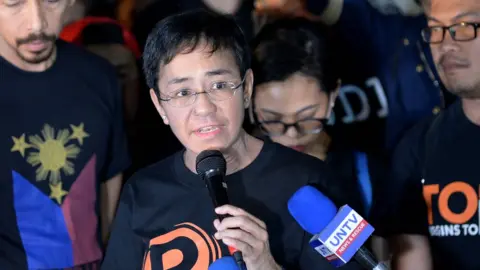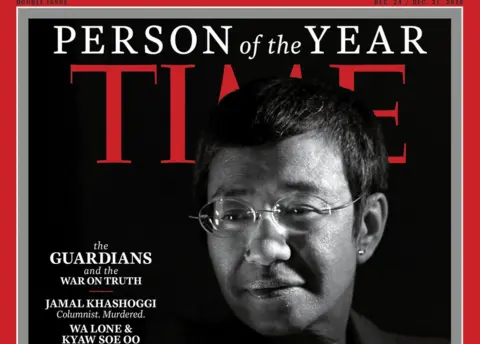Maria Ressa: The celebrated Philippine news boss enraging Duterte
 Getty Images
Getty ImagesShe is the award-winning journalist who has been at the centre of high-profile legal battles in the Philippines and is now the recipient of a Nobel Peace Prize.
To many, Maria Ressa has become a symbol of the fight for press freedom in a country where journalists are under threat.
But Philippine President Rodrigo Duterte and his supporters have accused her of peddling fake news through her website Rappler.
This is what you need to know about the news boss who enraged the president.
Leaving home
Ms Ressa was born in the Philippines, but moved to the US as a child after martial law was declared by Ferdinand Marcos in the early 1970s.
"I landed in New Jersey, where I could barely speak English, and I had to figure out what a short brown kid was going to do in this big white world," she told the BBC's Lyse Doucet.
She focused on education and after studying at the prestigious Princeton University, Ms Ressa returned to the Philippines to "find roots".
"I always felt that I wasn't as American as Americans and then I realised when I got back to the Philippines that I was not Filipino."
Becoming a journalist
Ms Ressa's return to the Philippines coincided with the 1986 People Power Revolution - when Filipinos took to the streets to overthrow Marcos.
 AFP/Getty
AFP/GettyHer move into journalism was initially a way of learning about the country she had grown distant from, but it soon became something more.
"I realised 'oh my God, somebody will pay me to write a story'," she said.
Her new career would also lead to her first meeting with Mr Duterte in the 1980s, when he was mayor of Davao city.
She went on to work in a number of senior media positions - including bureau chief for US network CNN in the Philippines and Indonesia, and head of the news division of Philippine TV channel ABS-CBN.
Creating Rappler
In 2012, Ms Ressa co-founded the online news site Rappler, merging "rap" meaning to talk and "ripples", to make waves.
She had ambitions of making Rappler the biggest news site in the Philippines, so "hired the smartest 20-somethings we could find" and "embraced social media".
Rappler now has more than 4.5m followers on Facebook and has become known for its intelligent analysis and hard-hitting investigations.
The site gained a lot of attention in 2015, when Mr Duterte - then Davao mayor - told Ms Ressa he had killed three people.
Observers say Ms Ressa has been central to Rappler's success.
"First, she has not backed down; she has continued to fight for what she believes in. She also has credibility. She has been in the industry for decades... and has done her job well.
"Then, she has access to international media and international connections," Joi Barrios-LeBlanc, a lecturer with the University of California at Berkeley's Southeast Asian Studies Department, said.
The BBC's Howard Johnson in Manila describes her as an engaging speaker, with a sharp analytical mind.
She is skilled at explaining complex social developments to her audience, particularly on the issue of social media and its influence, he adds.
Government criticism
Rappler is one of the few Philippine media organisations to be openly critical of Mr Duterte and his policies.
It has published extensively on the populist president's war on drugs, which has claimed thousands of lives.
Ms Ressa has personally reported on the spread of government propaganda on social media, while other Rappler stories have taken a critical look at issues of misogyny, human rights violations and corruption.
It has not gone unnoticed by Mr Duterte. Speaking to a Rappler reporter in 2018, the president said: "If you are trying to throw garbage at us, then the least that we can do is explain - how about you? Are you also clean?"
That same year, the president announced that he had banned Rappler's reporters from covering his official activities, and the government even revoked the site's operating licence.
 TIME MAGAZINE/MOISES SAMAN
TIME MAGAZINE/MOISES SAMAN
Ms Ressa has faced numerous legal cases.
In 2020, she was found guilty of "cyber-libel" in a case seen as a test of the country's media freedom. Rappler and Ms Ressa have also been targeted in other court cases, ranging from tax evasion to foreign ownership violations.
Ms Ressa has described all the cases against her as "political tools" - an assertion supported by activists and press freedom groups around the world. The government maintains their legitimacy.
Reputation
Ms Barrios-LeBlanc said Ms Ressa had come to represent the plight of journalists in the Philippines, and said "because she gained the attention of the international press, that is very significant".
Ms Ressa was named a Time Person of the Year in 2018 for steering Rappler "through a superstorm of the two most formidable forces in the information universe: social media and a populist President with authoritarian inclinations".
Upon receiving the 2021 Nobel Peace Prize, she was commended for using freedom of expression to "expose abuse of power, use of violence and growing authoritarianism in her native country".
Rachael Jolley, editor of the Index on Censorship magazine, recalled meeting Ms Ressa at a journalism festival before her name was widely known. Even then, she says she quickly came to view her as an "extraordinarily strong individual to be able to stand up to the government pressure".
Local journalist Ellen Tordesillas told the BBC Ms Ressa is "admired as one of those who stood up to Duterte".
But these views are not shared by everyone and Ms Ressa has said she is well used to receiving hate mail.
Our correspondent says Ms Ressa's reputation is tied to Mr Duterte's popularity, with his supporters directing much of the narrative about her on social media.
"With support for Duterte still at a significant high, and his mocking of her in the past, Ressa has been put in a sort of 'elite' category," an academic focused on South-East Asian studies, who asked not to be named, told the BBC last year.
"Her work is brilliant and much needed in keeping Duterte in check, but the populist - and outside of Manila - perception of her in the Philippines is she is 'out of touch'."
